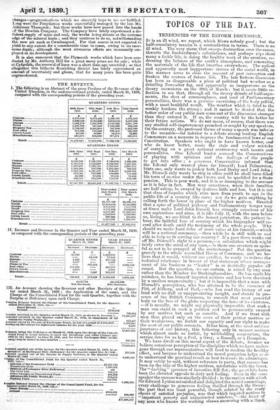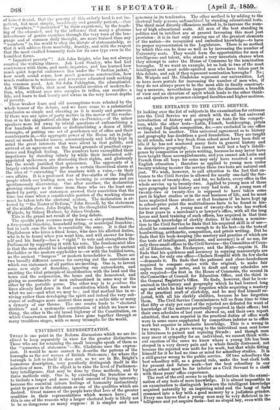TOPICS OF THE DAY.
TENDENCIES OF THE REFORM DISCUSSION.
IT is an ill wind, we repeat, which blows nobody good ; but the half-consolatory maxim is a contradiction in terms. There is no ill wind. Tho very storm that sweeps destruction over the ocean, thwarts the husbandman's calculations, and perhaps nips short many a feeble life, is doing the healthy work of the creation, re- dressing the balance of the earth's atmosphere, and renovating the materials of the life that breathes everywhere. The ugliest and apparently most inopportune storms of the social world, in like manner serve to close the account of past corruption and freshen the sources of future life. The late Reform diseuseion has been as disagreeable a piece of political bad weather as a drizzling November fog, and apparently as inopportune as the dreary snowstorm on the 30th of March ; but it needs little re- flection to see that, through all the dreary drizzle of half-ergo- ments, the sleet of commonplaces, and mud of Parliamentary personalities, there was a genuine exercising of the body politic with a most healthful result. The weather which is fatal to tlx; weakly hardens the strong ; and it cannot be denied that tho better order of our public men come out of the discussion stronger than they entered it. If so, the country will be the better for- their future actions. We do not mean, of course, that there was any studied self-improvement preached or sought by any speakers. On the contrary, the.professed theme of many a speech was inferior to the occasion-far inferior to a debate among leading English Commoners on a measure to improve the fundamental laws of our Constitution. Speakers who ought to have known better, and who do know better, made the stale and vulgar mistake of carrying on a great national controversy with taunts and personalities. One Liberal leader accused the Conservatives of playing with opinions and the feelings of the people to get into office ; a generous Conservative inferred that the Liberal only wanted place for himself; Lord Pamerston, hints one, only wants to jockey both Lord Derby and Lord John ; Mr. Disraeli only wants to stop in office until he shall have filled his term of seivice under the Crown and be qualified for a State pension. This is poor work, and it is as damaging to the accuser as it is false in fact. Men may sometimes, when their faculties are half asleep, he swayed by motives little and low, but it is net that class of impulse which stirs men from youth to age in the public life of a country like ours ; nor do we gain anything by calling forth the lower in place of the higher motives. Granted that a spice of political jealousy and Parliamentary temper may at times make Lord John Russell less strongly conscious of his
own as '
aspirations and aims it is idle folly if, with the man before us, living, we are blind to the honest patriotism, the patient la- bour, the faithful love of country which his biographer will re- cord after death amid the testimony of the whole people. Why should we make Lord John of more value at his funeral,-which will be a national ceremony,-than while he is still with us and able to help us in serving our country ? If a poor three weeks cut off Mr. Disraeli's right to a pension,-a calculation which might- fairly enter the mind of any man,-is there one creature so spite- ful as not to be annoyed at the contretemps? Put the question gravely to the whole assembled House of Commons, and we be- lieve that it would, without one caviller, be ready to redress the technical mischance in favour of that statesman whose manage- ment of his business as "leader " is so decidedly popular all* round. But the question, we are certain, is raised by any man rather than the Member for Buckinghamshire. He has made his mistakes, he has himself imputed motives and has been chastised by a spotless magnanimity ; but it is impossible that a mast with Disraeli 's perceptions, who has attained to be the successor of Pitt, of Althorp, and of Peel,-who has read the history of our land with no dull or unappreciating insight, and stands in pre- sence of the British Commons, to consult that most powerful body on the face of the globe respecting the laws of its existence, -it is morally, we might say. physically impossible that such a man can stand in such a position and be permanently swayed by any motives but such as ennoble. And if we treat with men thus placed only on the score of their pettier motives or their weaknesses, we forfeit our capacity and our right to muko the most of our public servants. It has been at the most sublime junctures of our history, this believing only in meaner motives which almost made us forfeit, by withholding cooperation, the service done for us by a Peel, a Grey, a Russell, or a Hampden. We have dwelt on this moral aspect of the debate, because we believe conscious perception of the discipline which we have under- gone through our representatives will tend to confirm the healthy effect, and because to understand the moral purgation helps us so to understand the practical result as best to secure its advantages. It may safely be said, without reference to party, that success has been on the side of the higher motives, misfortune with the lower. The "dashing" speeches of invective fell flat; the great hits have been the elevated appeals to duty and feeling. Even in the tame speaker the success was similarly divided : in the oration with w high Sir Edward Lytton astonished and delighted the mixed assemblage, every challenge to generous feeling thrilled through the House; the part that was least powerful, though saluted by the ready cheers of satisfied prejudice, was that which imputed motives to, "impatient poverty and uninstructed numbers, -the hear of, any man who knows the working classes answering with a throb
of honest denial, that the poverty of this orderly land is not im- patient, but most simply, touchingly and grandly patient,—that the "numbers," " instructed " by their experience, by the teach- ing of the educated, and by the influence that many a glorious inheritance of genius exercises through the very turn of the lan- guage and of common daily thought, are more trained than any " numbers " in the world to obey the dictate of statesmanship, so that it will address them manfully, frankly, and with the respect that the most exalted humanity feels for its own type even in the humblest forms.
"Impatient poverty " ! Ask John Bright, who has not always courted the working classes. Ask Lord Stanley, who had had conferences with them, and made inquiries, and has learned how much quiet hopeful endurance lies under the "fustian jacket," how much sound sense, how much generous construction, how much readiness to welcome and reverence educated rank seeking the common good. Ask Sir John Pakington' the educationist. Ask William Waife, that most beautiful creation of modern fic- tion, who, without over nice scruples in trifles, can sacrifice a life, and learn to find beauty and virtue in the very lowest depths of poverty. These weaker fears and old assumptions were rebuked by the whole tenour of the debate, and we have come to a substantial conclusion as simple and cheering as it is manly and generous. If there was any spice of party motive in the mover of the resolu- tion or in his enigmatical abettor the ex-Premier,—if the minor speakers were led away by trivial questions of enfranchising a few hundreds of thousands Or disfranchising a dozen of little boroughs, of putting one set of gentlemen out of office and their counterparts in,—the aggregate power of the House sat in judg- ment on much broader issues, conscientiously: and loftily kept in mind the great interests that were silent in that gabble, and arrived at an agreement on the broad grounds of practical expe- rience and English feeling. The numbers have exemplified their impatience by standing calmly by while their instructed self- appointed spokesmen are discussing their rights, and gloriously has the result justified that quiescence. The opponents of a largely extended franchise profess a certain theoretical alarm at the idea of " entrusting " the numbers with a voice,—in their own affairs. It is a professed fear of five-sixths of the English people which our leading men are learning to overcome and are spontaneously disavowing. One after another, the declaration growing stronger as it came from those who are the least ani- mated by party, our statesmen avowed their conviction that the time has come when a considerable portion of the working classes
— must be taken into the electoral system, The declaration is at- tested by "the Nestor of Reform," John Russell, by the statesman of the middle class, John Bright, by the thoughtful Conservative, Walpole, by Sidney Herbert, by James Graham. This is the grand net result of the long debate. The specific plan assumes many forms—a six-pound franchise, a five-pound franchise, household rating, or mumcipal franchise ; but in each case the idea is essentially the same. It is that the Englishman who hires a fixed home, who does his allotted duties, who is to be found when you want him and will answer for him- self and his family—has a " right " t!co vote and strengthens the Parliament by supporting it with his vote. The fundamental idea is that the men should be identified with the land—as the ancient freeholder or the modern copyholder is—or with the builded town, as the ancient " burgess " or modern householder is. There are two broadly different courses for carrying out the conviction on which our statesmen of all parties are meeting. One is to invent some new style of franchise, ignoring our antecedents, and omitting the vital principle of identification with the land and the town and the corporation, the home and the homestead, and giving us assortments of men enfranchised in some way or the other by the portable purse. The other way is to produce the lines already laid down in that constitution which has made us what we are—and what we may be ; and that method lies in re- viving rather than developing the spirit and indeed the very sub- stance of suffrages more ancient than many a noble title or many a dynasty of our throne. The one course leads to "electoral districts" and a systematic constitution of which we know no- thing, the other is the old broad highway of the Constitution, on which Conservation and Reform have gone together through so many troublons stages, with so many triumphs for the world.



























 Previous page
Previous page